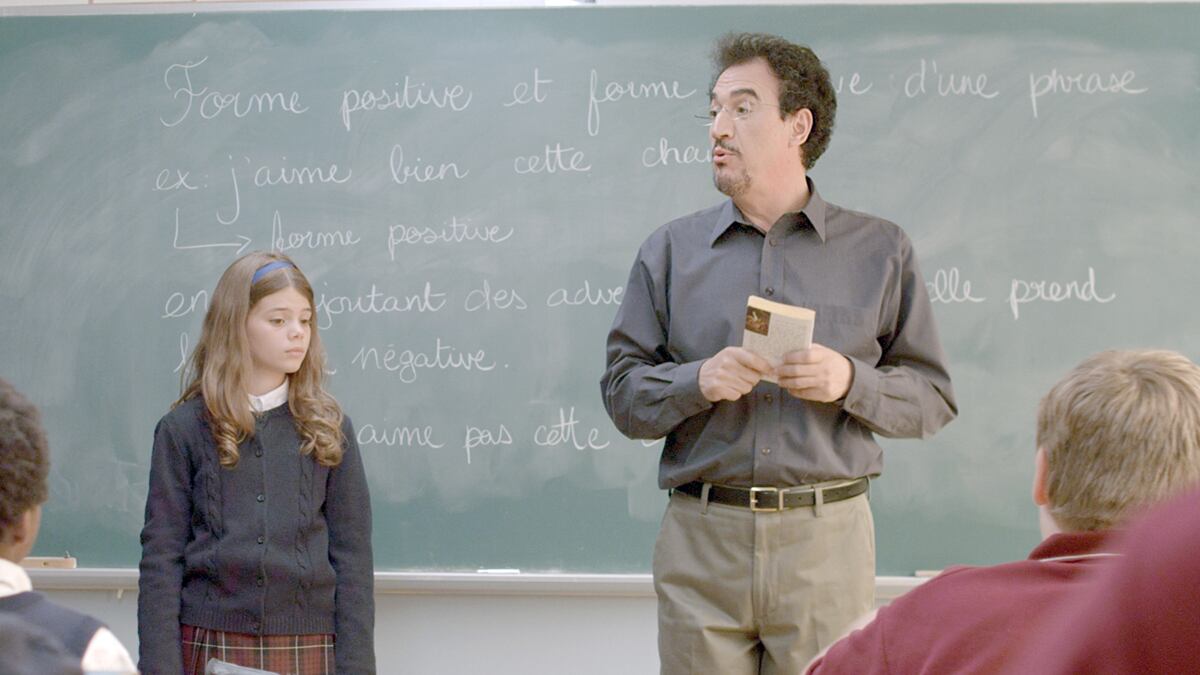When the outstanding Canadian film, Monsieur Lazhar, opens in several American cities this week, it may restart conversations about an always touchy topic. Immigration remains one of the hot-button issues throughout the country, which may explain why only a few American movies have dared to address this subject. Chris Weitz’s A Better Life earned a surprising and well deserved Oscar nomination for its lead actor, Demian Bichir, who gave a superb performance as an illegal immigrant from Mexico struggling to keep control of his family. Three years earlier Richard Jenkins also received an Oscar nod for his role in The Visitor, the story of a professor whose life is transformed by his encounter with a Middle Eastern immigrant threatened with deportation. The audience for both movies was rather small, perhaps because the subject hit a nerve too painful for many American moviegoers.
If this subject is still controversial here, with several states trying to follow Arizona’s lead in restricting and repressing illegal immigrants, it is just as volatile a topic in many other countries. Several of the top foreign films of recent years—including a number of Oscar submissions—have highlighted conflicts regarding immigration. In the 2011 Oscar race, Le Havre from Finland, Terraferma from Italy, Omar Killed Me from Morocco, and Sonny Boy from the Netherlands all dealt with immigration. The subject also added urgency to recent films Outside the Law, a drama about Algerians resettling in France; Biutiful, which dealt in part with smuggling illegal immigrants into Spain; A Prophet, about an Arab who takes control of a prison gang in France; and The Edge of Heaven, a poignant meditation on Turkish immigrants in Germany.
One of the strongest of all these films is Monsieur Lazhar, one of the five nominees for best foreign language film of 2011. When people think of countries where immigration is a controversial issue, they might easily identify France or Germany or England in addition to the United States. But they probably wouldn’t think of problems arising in Canada. Yet it’s revealing that the last two Canadian films nominated for Oscars—Monsieur Lazhar and Incendies—both dealt in part with the trauma surrounding immigration.

In 2010’s Incendies, the immigrants were a family transplanted from Lebanon. In Monsieur Lazhar the main character is an Algerian who takes over an elementary school class in Montreal after the suicide of a beloved teacher. These are two of the best foreign films of recent years, and they both concern the anguish of relocation. Luc Dery, who produced both films, suggests that it may not be coincidental that his company, Micro_scope Productions, backed both projects. “In recent years there was criticism of Quebec films for not including enough immigrant characters,” Dery says. “So there has been a rebound, and many of our films deal with the subject now. To be honest, it’s also a way of giving our films more impact in the international marketplace.”
The protagonist of Monsieur Lazhar, Bachir Lazhar (played by Algerian actor Fellag) is a man seeking political asylum in Canada because of violence against his family in Algeria. In addition to gripping scenes about student-teacher relations, the film incorporates a number of scenes of Lazhar and his lawyer arguing his case before skeptical immigration authorities.
According to writer-director Philippe Falardeau, the subject of immigration has only recently moved to the forefront in Canada. “In the past we took for granted that Canada was a welcoming country,” Falardeau comments. “We were a land of immigrants, like the United States, and we encouraged French-speaking immigrants to Quebec and Eastern European immigrants to populate the western part of the country. But as our economy became more fragile and the population rose, more people started questioning whether we were allowing too many immigrants. And after 9/11, the Canadian government aligned itself with the U.S. in becoming more restrictive. The paranoia toward the Arab world began to grow.”
Monsieur Lazhar is based on a play by Evelyne De La Cheneliere that consisted of a monologue by the character of Lazhar. In transforming this one-character play into a fully populated film, Falardeau elaborated on many of the subjects addressed more fleetingly in the play. He did extensive research into the immigration procedures that affect the character of Lazhar. The director interviewed lawyers and read applications of immigrants seeking political asylum. “I wanted to be true and also dramatic,” Falardeau says. “I asked lawyers to go over the script to verify the accuracy.”
In addition, Falardeau spent a week in Algeria. Although the country was calmer than it was during the 1990s, when an all-out civil war raged between Islamic radicals and their countrymen, Falardeau still gained a sense of the danger that would have led someone like Lazhar to emigrate. “In the week I was there, there were six bombings,” Falardeau says. “It wasn’t like the 90s. But as a character says in the film, ‘Nothing is ever normal in Algeria.’”
The director was determined to find an Algerian actor to portray Lazhar, and after a long search, he decided on Fellag, an Algerian native who was forced into exile during the civil war and eventually settled in Paris, where he has become known for his one-man stage shows. Dery says, “We discarded a number of French actors who had the look but spoke with a French accent that didn’t sound quite right. We wanted someone who would look believable but also had the necessary acting talent. In the end we found the best actor for the role.”
While the subject of immigration may be the timeliest issue raised by Monsieur Lazhar, it is by no means the sole focus of the film. In dealing with the aftermath of a teacher’s suicide, the film explores themes of grief and mourning and the discomfort that arises when children are forced to confront death. Falardeau also exposes restrictive new classroom protocols that forbid any physical contact between teachers and students, as well as the way in which teachers are often intimidated by overly intrusive, controlling parents. “Films usually tackle just one subject,” Falardeau observes. “But life is never about just one subject. In a way a school is a great microcosm of society because all issues arise in a classroom.”
Considering that the film is based on a one-character play, it’s astonishing that Falardeau has packed so many ideas and characters into a taut 94-minute film. He has also drawn remarkable performances from the child actors, who always seem expressive and believable, never cloying. This rich, resonant film has been a box office success all across Canada. “It’s one of the few films that did very well in French Canada and also in English-speaking Canada,” Dery says. The filmmakers hope it will draw equally appreciative audiences in America, for Monsieur Lazhar speaks profoundly about the world we inhabit today, a new multi-ethnic world where national boundaries are becoming increasingly irrelevant.




